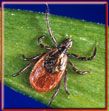
Your Subtitle text
Tick Testing Service-Tick Testing Lyme Disease-Tick Testing Massachusetts-Testing Ticks-Where Do I t
So you found a tick and you want it tested?
Sample Submission
UMass Extension, at UMass Amherst, will assess specimens to determine whether they are black legged ticks (deer ticks), and will determine whether or not they carry the bacterium that causes Lyme Disease. The test can detect the Lyme disease pathogen from a single tick. There is a fee of $40 per sample.
Ticks can also be analyzed for babesiosis and anaplasmosis for $100. The test for Lyme disease must also be ordered at the same time costs $140.
To submit a sample, download the submission form and follow the instructions.
Tick Sample Submission Form
Address packages to:
UMass Extension Tick Assessment
Agricultural Engineering Building, 250 Natural Resources Way
University of Massachusetts, Amherst, MA 01003
Use exact address to ensure delivery.
For specific information, contact:
Dr. Craig Hollingsworth, (413) 545-1055,
chollingsworth@umext.umass.edu
What is the turn-around time for diagnostic results?
Typically, we open tick samples on TUESDAY afternoon and begin processing the ticks that day. So far, we have always been able to send results by the end of that week. Specimens that arrive after TUESDAY are processed the following week. Keep in mind that UMass mail can require one extra day for campus distribution.
Is your tick good enough?
A number of people have called to ask if their ticks can be analyzed. The answer is almost always “YES.” We have successfully processed broken and torn, water-soaked, dried-up and alcohol-bathed ticks. A few extra days in the mailbox will not affect the results. We prefer that you do NOT encase your tick in tape, but if the deed has been done we can deal with it,. The best samples are fresh ticks that have been treated as directed on the sample submission form. If we cannot process your tick, we will refund your fee.
About the diagnostic tests
Polymerase chain reaction (PCR) testing detects the genetic material (DNA) of the Lyme disease bacteria and other pathogens. If a tick contains the specific pathogen, the test will give a positive result. If the tick does not contain the pathogen, we will receive a negative result. The test will NOT indicate whether the tick has transmitted the disease. This depends on the amount of pathogen it is carrying and how long it has fed. A negative result however should assure individual that disease transmission from a particular tick is not expected.
The Massachusetts Department of Public Health offers the following advice with regard to tick test results.
Tests performed on the ticks are not perfect and they do not test for all infections ticks may be carrying. Therefore, even with a negative result, people should still monitor themselves for the appearance of rash, fever or other unusual symptoms and immediately seek the advice of a health care provider should any symptoms occur.
If someone has been infected by a tick bite, symptoms may begin to occur even before the results of tick testing are available. People should not to wait for tick testing results before seeking medical advice should any symptoms develop.
A positive test on a tick is not an automatic indication that treatment is needed. A positive test indicates that the tick was infected but not that the tick was successful in spreading the infection to the person bitten. The longer a tick is attached to you, the greater the chance that it will spread infection. Discuss any positive test results with your health care provider.
UMass Extension, at UMass Amherst, will assess specimens to determine whether they are black legged ticks (deer ticks), and will determine whether or not they carry the bacterium that causes Lyme Disease. The test can detect the Lyme disease pathogen from a single tick. There is a fee of $40 per sample.
Ticks can also be analyzed for babesiosis and anaplasmosis for $100. The test for Lyme disease must also be ordered at the same time costs $140.
To submit a sample, download the submission form and follow the instructions.
Tick Sample Submission Form
Address packages to:
UMass Extension Tick Assessment
Agricultural Engineering Building, 250 Natural Resources Way
University of Massachusetts, Amherst, MA 01003
Use exact address to ensure delivery.
For specific information, contact:
Dr. Craig Hollingsworth, (413) 545-1055,
chollingsworth@umext.umass.edu
What is the turn-around time for diagnostic results?
Typically, we open tick samples on TUESDAY afternoon and begin processing the ticks that day. So far, we have always been able to send results by the end of that week. Specimens that arrive after TUESDAY are processed the following week. Keep in mind that UMass mail can require one extra day for campus distribution.
Is your tick good enough?
A number of people have called to ask if their ticks can be analyzed. The answer is almost always “YES.” We have successfully processed broken and torn, water-soaked, dried-up and alcohol-bathed ticks. A few extra days in the mailbox will not affect the results. We prefer that you do NOT encase your tick in tape, but if the deed has been done we can deal with it,. The best samples are fresh ticks that have been treated as directed on the sample submission form. If we cannot process your tick, we will refund your fee.
About the diagnostic tests
Polymerase chain reaction (PCR) testing detects the genetic material (DNA) of the Lyme disease bacteria and other pathogens. If a tick contains the specific pathogen, the test will give a positive result. If the tick does not contain the pathogen, we will receive a negative result. The test will NOT indicate whether the tick has transmitted the disease. This depends on the amount of pathogen it is carrying and how long it has fed. A negative result however should assure individual that disease transmission from a particular tick is not expected.
The Massachusetts Department of Public Health offers the following advice with regard to tick test results.
Tests performed on the ticks are not perfect and they do not test for all infections ticks may be carrying. Therefore, even with a negative result, people should still monitor themselves for the appearance of rash, fever or other unusual symptoms and immediately seek the advice of a health care provider should any symptoms occur.
If someone has been infected by a tick bite, symptoms may begin to occur even before the results of tick testing are available. People should not to wait for tick testing results before seeking medical advice should any symptoms develop.
A positive test on a tick is not an automatic indication that treatment is needed. A positive test indicates that the tick was infected but not that the tick was successful in spreading the infection to the person bitten. The longer a tick is attached to you, the greater the chance that it will spread infection. Discuss any positive test results with your health care provider.

